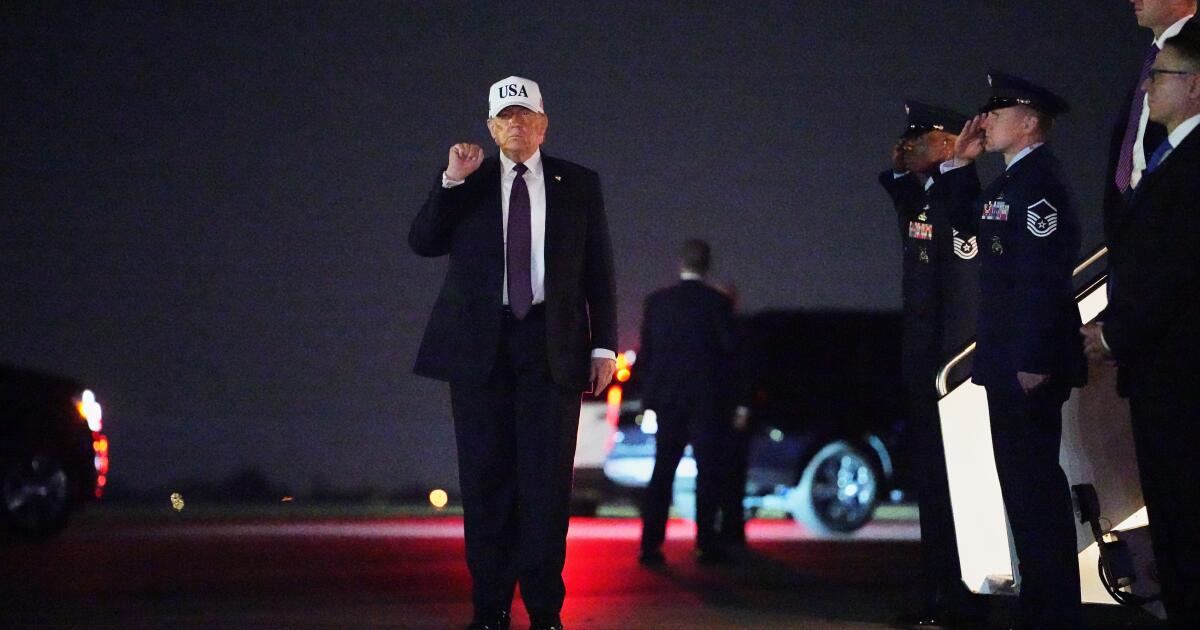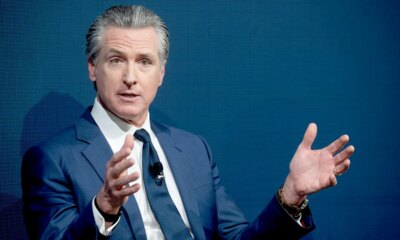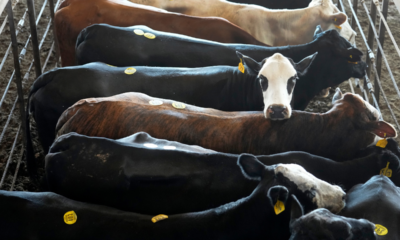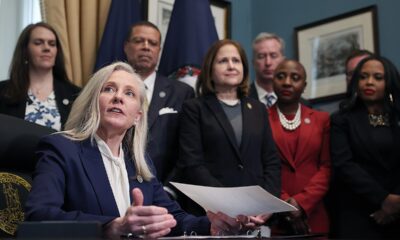Politics
Analysis: Europe, too, feels Musk's political impact. How far will it go?

In the six weeks since Donald Trump won the presidential election, Europe has been bracing for a U.S. administration that could strain traditional transatlantic alliances.
That sense of uncertainty has just been turbocharged by a disruptive new force: multibillionaire Elon Musk, who has made it clear he intends to leave his mark on politics and policy not only in Washington but in Europe as well.
On Friday, as U.S. lawmakers were racing to avert a looming government shutdown, Musk used his social media platform X to tout his strong support for a far-right political party in Germany that is looking to increase its clout in the wake of this month’s meltdown of the three-party ruling coalition of Chancellor Olaf Scholz.
“Only the AfD can save Germany,” Musk wrote, using the German initials for Alternative for Germany, the party best known for its stridently anti-immigrant stance, longtime ties to neo-Nazis and the “extremist” designation that Germany’s domestic intelligence service has given its youth wing.
The world’s richest man had previously made provocative statements about German politics, but the timing of his latest remarks — coinciding with signals he intends to leverage his Trump administration position leading an advisory commission on government efficiency into a wide-ranging role in the new U.S. administration — stirred unease not only in Germany but across Europe.
Establishment parties and governments elsewhere on the continent are feeling vulnerable after a series of anti-system jolts, including the ouster this month of France’s prime minister, Michel Barnier, in a heavy blow to President Emmanuel Macron, who appointed him.
Mainstay organizations including the European Union and NATO also are watching and worrying over the potential for destabilizing moves by Trump that could include protracted trade disputes and a withdrawal of crucial U.S. military support for Ukraine as it seeks to fight off a nearly three-year-old full-scale invasion by Russia.
Musk’s foray into German politics came just after far-right British politician Nigel Farage, who for years has been a fixture in Trump’s orbit, declared this week that the South African-born Tesla and Space X magnate was considering a historically large contribution to his Reform U.K. party — prompting calls for swift action to tighten Britain’s rules on political donations, which are already far stricter than those in the United States.
In Germany, Europe’s economic powerhouse and political center of gravity, Musk’s commentary roiled the political establishment — and drew expressions of glee from supporters of the AfD, whose nationalist-populist message has helped it make inroads this year in state and European Parliament elections.
The party hopes to mount a strong challenge to Friedrich Merz, the frontrunner to replace Scholz in a national vote expected in February, but other leading political blocs have already declared they would not accept the AfD as a coalition partner.
AfD’s leader Alice Weidel quickly thanked Musk for his online vote of confidence, declaring: “You are perfectly right!”
In a video posted on X shortly after the billionaire’s accolade landed, she said the AfD “is indeed the one and only alternative for our country — our last option, if you ask me!”
Scholz has been something of a punching bag for his opponents across the political spectrum over Germany’s floundering economy, but the Musk broadside prompted some of his chief rivals to come to his defense — often with acid commentary about Musk.
“We usually hear that Elon Musk is this gifted wunderkind, but when I hear these comments, I have to doubt that,” Alexander Throm of the center-right Christian Democratic Union, which is leading opinion polls in advance of February’s vote, told the public broadcaster Deutsche Welle.
Another Christian Democratic politician, lawmaker Dennis Radtke, branded Musk’s remarks as interference in German elections. Speaking to the Handelsblatt daily, he called the comments “threatening, irritating and unacceptable.”
Rare agreement came from a leading politician in what is considered the most leftist party in Germany’s political mix. “He’s not really contributing anything, policywise,” Clara Buenger of the Left Party said of Musk.
“He doesn’t really know how political discussions work in Germany,” she said.
Scholz himself adhered at least in part to his typical low-key political style in responding to this episode. Without naming Musk, he pointed out that Germany’s political system allows for freedom of expression, which “also applies to multibillionaires.”
But the chancellor used sharper than usual language, for him, to challenge Musk’s characterization of the AfD as a national savior. Freedom to speak out, he said pointedly, “also means that you’re allowed to say things which aren’t correct, and aren’t good political advice.”
Musk also had jeered at the collapse of the governing coalition, and at one point tweeted in German that the chancellor was a “fool.” Scholz responded at the time that the remark was “not very friendly.”
The billionaire entrepreneur-turned-efficiency expert has opined previously about the AfD, expressing his bafflement at the mainstream unease it prompts within Germany over echoes of the country’s Nazi past.
The country has legal prohibitions on use of Third Reich-style language and symbols, and there has been more than one case involving prosecution of an AfD figure for flouting those laws.
“They keep saying ‘far right,’ but the policies of AfD that I’ve read about don’t sound extremist,” Musk posted in June. “Maybe I’m missing something.”
In the United States, Trump’s elevation of Musk has prompted little opposition from within his own Republican party. In Europe, however, there is considerably more wariness.
After British politician Farage was pictured posing this week with Musk at Trump’s Mar-a-Lago resort, and Farage confirmed that a potentially huge donation from Musk to his party could be in play — $100 million, according to at least one British report — some British lawmakers and transparency advocates urged that measures be put in place to prevent such an unprecedentedly large infusion of foreign cash.
While Britain curtails how much political parties are allowed to spend on elections, there is no ceiling on donations from within the United Kingdom. Musk could get around that with the British registration of the British arm of X.
“It’s crucial that U.K. voters have trust in the financing of our political system,” the chief executive of Britain’s Electoral Commission, Vijay Rangarajan, told the Guardian newspaper. “The system needs strengthening.”
Musk has made clear his disdain for Prime Minister Keir Starmer of the left-leaning Labor Party, and has often voiced criticism of British policies on immigration and policing.
Farage, for his part, cites Trump as a populist role model, and shares the president-elect’s antipathy toward bodies such as the European Union. His Reform party picked up about 14% of the vote in June elections, its strongest showing ever.

Politics
Mamdani’s response to Trump’s Iran strike sparks conservative backlash: ‘Rooting for the ayatollah’

NEWYou can now listen to Fox News articles!
New York City’s socialist Mayor Zohran Mamdani is facing blowback from conservatives on social media over his post condemning the U.S. attack on Iran that led to the killing of Iran’s supreme leader, Ayatollah Ali Khamenei.
On Saturday, as a joint strike on Iran by the United States and Israel was developing, Mamdani blasted the Trump administration’s decision in a post on X that has been viewed roughly 20 million times.
“Today’s military strikes on Iran — carried out by the United States and Israel — mark a catastrophic escalation in an illegal war of aggression,” Mamdani wrote.
“Bombing cities. Killing civilians. Opening a new theater of war. Americans do not want this. They do not want another war in pursuit of regime change.”
New York City Mayor Zohran Mamdani speaks to reporters during a news conference in New York Feb. 17, 2026. (AP Photo/Seth Wenig)
Mamdani said Americans prefer “relief from the affordability crisis” before speaking directly to Iranians in New York City.
“You are part of the fabric of this city — you are our neighbors, small business owners, students, artists, workers, and community leaders,” Mamdani said. “You will be safe here.”
The post was quickly slammed by conservatives on social media making the case that Mamdani’s response appeared sympathetic to Iran’s brutal regime and pointing to his lack of public reaction to the Iranian protesters killed in recent years.
“Comrade Mayor is rooting for the Ayatollah,” GOP Sen. Ted Cruz posted on X. “They can chant together.”
OBAMA OFFICIAL WHO BACKED IRAN DEAL SPARKS ONLINE OUTRAGE WITH REACTION TO TRUMP’S STRIKE: ‘SIT THIS ONE OUT’
“Do u say anything pro American ?” Fox News host Brian Kilmeade posted on X. “do u know any Iranians – ? they hate @fr_Khamenei they celebrate his death, you should be celebrating his death ! hes killed thousands of American’s and just killed 30k Iranians, did u even say a word about that? You are an embarrassment !! Please quit.”
Sen. Ted Cruz, R-Texas, questions Pam Bondi, President-elect Donald Trump’s nominee to be attorney general, during her Senate Judiciary Committee confirmation hearing in Hart building Jan. 15, 2025. (Tom Williams/CQ-Roll Call, Inc via Getty Images)
“I don’t feel safe in New York listening to someone like you, Mamdani, who sympathizes with the regime that killed more than 30,000 unarmed Iranians in less than 24 hours,” Iranian American journalist Masih Alinejad posted on X.
“We Iranians do not allow you to lecture us about war while you had nothing to say when the Islamic Republic shot schoolgirls and blinded more than 10,000 innocent people in the streets. You were busy celebrating the hijab while women of my beloved country Iran were jailed and raped by Islamic Security forces for removing it.
“And NOW you find your voice to defend the regime? No. I will not let you claim the moral high ground. The people of Iran want to be free. Where were you when they needed solidarity?”
CLICK HERE TO DOWNLOAD THE FOX NEWS APP
“How is it that you can’t differentiate between good and evil?” Billionaire hedge fund manager Bill Ackman posted on X. “Why is this so hard for you?”
“It takes a particular kind of audacity, or ignorance, for a city mayor to appoint himself the conscience of American foreign policy while his constituents step over garbage on their way to work,” GOP Rep. Nancy Mace posted on X. “History will not remember his bravery. It will not remember him at all.”
“Iranian New Yorkers are thrilled today and see right through you,” Republican New York City Councilwoman Vickie Paladino posted on X.
Bill Ackman, CEO of Pershing Square Capital Management LP, speaks during the WSJ D.Live global technology conference in Laguna Beach, Calif., Oct. 17, 2017. (Patrick Fallon/Bloomberg/Getty Images)
“When Kuwait, Saudi Arabia, Qatar, Turkey, UAE, Bahrain all support today’s operation eliminating world’s #1 sponsor of terror, but New York City’s Mayor @ZohranMamdani is shilling for Iran,” Republican New York City Councilwoman Inna Vernikov posted on X.
Fox News Digital reached out to Mamdani’s office for comment.
Shortly after Mamdani’s post, it was announced by President Trump and Israeli officials that the military operation resulted in Khamenei’s death.
Israeli leaders confirmed Khamenei’s compound and offices were reduced to rubble early Saturday after a targeted strike in downtown Tehran.
“Khamenei was the contemporary Middle East’s longest-serving autocrat. He did not get to be that way by being a gambler. Khamenei was an ideologue, but one who ruthlessly pursued the preservation and protection of his ideology, often taking two steps forward and one step back,” Behnam Ben Taleblu, senior director of FDD’s Iran program, told Fox News Digital.
Politics
Trump vowed to end wars. He is now opening a new front against Iran

WASHINGTON — For a decade, President Trump promised to end what he calls forever wars, casting himself as a leader opposed to prolonged conflicts in the Middle East and who would rather pursue peace in the world.
Now, early in his second term, Trump is taking military action against Iran that could expand well beyond a limited effort to halt the country’s nuclear program.
In a video posted on Truth Social, the commander in chief said American forces also plan to “raze their missile industry to the ground” and “annihilate their navy.” He warned members of Iran’s military to surrender or “face certain death.” And urged the Iranian people to take the moment as an opportunity to rise up against their government.
“This regime will soon learn that no one should challenge the strength and might of the United States armed forces,” Trump said.
A few hours after relaying that message, Trump confirmed in a separate social media post that Ayatollah Ali Khamenei, the supreme leader of Iran, was among those killed by U.S. and Israeli strikes. Even with his death, Trump said that “the heavy and pinpoint bombing” would continue in Iran “as long as necessary to achieve our objective of PEACE THROUGHOUT THE MIDDLE EAST AND, INDEED, THE WORLD!”
Trump, who has been considering a strike on Iran for several weeks, acknowledged he reached the decision to attack Iran while aware of the human toll that could come with it.
“The lives of courageous American heroes may be lost, and we may have casualties. That often happens in war,” he said. “But we are doing this, not for now, we are doing this for the future, and it is a noble mission.”
Trump’s military campaign in Iran is a sharp turn in tone for a president who has long been critical of open-ended conflicts in the Middle East, and marks a shift from an America-first agenda message that helped him return to the White House.
“I’m not going to start a war. I’m going to stop wars,” Trump said in his November 2024 victory speech as he promised to focus national resources on domestic priorities rather than foreign conflicts.
As Trump advocated to bring home American forces from deployments around the world and to withdraw from key defense treaties, his position resonated with a war-weary electorate in the lead-up to the election.
Fewer than six in 10 Americans (56%) believed the United States should take an active role in world affairs ahead of the election — the second-lowest level recorded since the question was first asked in 1974, according to polling by the Council on Foreign Affairs.
Trump’s posture on war in the Middle East had been largely consistent before he ran for office.
In 2013, he criticized then-President Obama’s negotiations with Tehran, predicting in a post on Twitter that Obama would “attack Iran because of his inability to negotiate properly.” That same year, Trump warned that “our horrendous leadership could unknowingly lead us into World War III.”
And in a heated February 2016 debate, Trump attacked former Florida Gov. Jeb Bush, stating that his brother George W. Bush lied about Iraq’s nuclear capabilities to get the U.S. into the Iraq war. Trump called the Iraq war a “big, fat mistake” that “destabilized the Middle East.”
“They lied. They said there were weapons of mass destruction. There were none, and they knew there were none,” he said.
At the time of the Iraq war, however, Trump had said he supported it.
Trump’s confrontation with Iran bears little resemblance to his earlier rebukes.
Trump has yet to present evidence of an imminent threat to the United States from Iran’s nuclear program — a capability he claimed to have “obliterated” just eight months ago — and has instead framed the military campaign as one to ensure Tehran never develops nuclear weapons at all.
“It is a very simple message,” he said. “They will never have a nuclear weapon.”
Trump’s shift has already drawn the attention of congressional Democrats, many of whom are calling the president out for backing out on his promise to end foreign wars — and are demanding that he involve Congress in any further military actions.
“Regardless of what the President may think or say, he does not enjoy a blank check to launch large-scale military operations without a clear strategy, without any transparency or public debate, and not without Congressional approval,” Sen. Alex Padilla (D-Calif.) said.
Sen. Adam Schiff (D-Calif.) criticized Trump for “drawing the country into yet another foreign war that Americans don’t want and Congress has not authorized.”
The military involvement in Iran is not the first time that members of Congress have complained about the Trump administration’s willingness to sideline the legislative branch on decisions that could trigger broader conflicts this year.
In January, Trump ordered military forces to capture former Venezuelan President Nicolás Maduro and said the United States would run the sovereign nation until further notice. He threatened military action in Colombia, whose leftist President Gustavo Petro has been one of Trump’s most vocal critics.
Trump has alienated allied nations when he said he was willing to send American troops to seize Greenland, a semiautonomous territory of Denmark. And on Friday, he said U.S. is in talks with Havana and raised the possibility of a “friendly takeover of Cuba” without offering any details on what he meant.
His actions have coincided with his annoyance at not being awarded the Nobel Peace Prize. At one point, the president said he no longer felt an “obligation to think purely of Peace” because he didn’t get the recognition.
Trump’s shifting tone, and his use of violent war imagery in his pretaped remarks about Iran, have rattled even part of his base.
“I did not campaign for this. I did not donate money for this,” said former Rep. Marjorie Taylor Greene, a conservative who recently left Congress after a bitter fight with Trump. “This is not what we thought MAGA was supposed to be. Shame!”
Republican leaders, however, are largely standing behind the president.
Senate Majority Leader John Thune (R-S.D.) said Iran “posed a clear and unacceptable threat” to the United States and has refused “the diplomatic off-ramps.” House Speaker Mike Johnson (D-La.) said Trump took the action after exhausting “every effort to pursue peaceful and diplomatic solutions.”
Other top Republican lawmakers rallied behind Trump, too.
“The butcher’s bill has finally come due for the ayatollahs,” Sen. Tom Cotton, the chairman of the Senate Intelligence Committee, wrote in a post on X. “May God bless and protect our troops on this vital mission of vengeance, and justice, and safety.”
Politics
Iran fires missiles at US bases across Middle East after American strikes on nuclear, IRGC sites

NEWYou can now listen to Fox News articles!
Iran launched missile and drone strikes targeting U.S. military facilities in multiple Middle Eastern countries Friday, retaliating after coordinated U.S.–Israeli strikes on Iranian military and nuclear-linked sites.
Explosions were reported in or near areas hosting American forces in Bahrain, Qatar, the United Arab Emirates, Kuwait and Jordan, according to regional officials and state media accounts. Several of those governments said their air defense systems intercepted incoming projectiles.
It remains unclear whether any U.S. service members were killed or injured, and the extent of potential damage to American facilities has not yet been confirmed. U.S. officials have not publicly released casualty figures or formal damage assessments.
Iran’s Islamic Revolutionary Guard Corps (IRGC) described the operation as a direct response to what Tehran called “aggression” against Iranian territory earlier in the day. Iranian officials claimed they targeted U.S. military infrastructure and command facilities.
Explosions were reported in or near areas hosting American forces in Bahrain, pictured above. (Photo by Petty Officer 2nd Class Adelola Tinubu/U.S. Naval Forces Central Command/U.S. 5th Fleet )
The United States military earlier carried out strikes against what officials described as high-value Iranian targets, including IRGC facilities, naval assets and underground sites believed to be associated with Iran’s nuclear program. One U.S. official told Fox News that American forces had “suppressed” Iranian air defenses in the initial wave of strikes.
Tomahawk cruise missiles were used in the opening phase of the U.S. operation, according to a U.S. official. The campaign was described as a multi-geographic operation designed to overwhelm Iran’s defensive capabilities and could continue for multiple days. Officials also indicated the U.S. employed one-way attack drones in combat for the first time.
IF KHAMENEI FALLS, WHO TAKES IRAN? STRIKES WILL EXPOSE POWER VACUUM — AND THE IRGC’S GRIP
Smoke rises after reported Iranian missile attacks, following strikes by the United States and Israel against Iran, in Manama, Bahrain, Feb. 28, 2026. (Reuters)
Iran’s retaliatory barrage targeted countries that host American forces, including Bahrain — home to the U.S. Navy’s Fifth Fleet — as well as Qatar’s Al Udeid Air Base and the UAE’s Al Dhafra Air Base. Authorities in those nations reported intercepting many of the incoming missiles. At least one civilian was killed in the UAE by falling debris, according to local authorities.
Iranian officials characterized their response as proportionate and warned of additional action if strikes continue. A senior U.S. official described the Iranian retaliation as “ineffective,” though independent assessments of the overall impact are still developing.
Smoke rises over the city after the Israeli army launched a second wave of airstrikes on Iran in Tehran on Feb. 28, 2026. (Fatemeh Bahrami/Anadolu via Getty Images)
CLICK HERE TO DOWNLOAD THE FOX NEWS APP
Regional governments condemned the strikes on their territory as violations of sovereignty, raising the risk that additional countries could become directly involved if escalation continues.
The situation remains fluid, with military and diplomatic channels active across the region. Pentagon officials are expected to provide further updates as damage assessments and casualty reviews are completed.
Fox News’ Jennifer Griffin contributed to this report.
-

 World3 days ago
World3 days agoExclusive: DeepSeek withholds latest AI model from US chipmakers including Nvidia, sources say
-

 Massachusetts4 days ago
Massachusetts4 days agoMother and daughter injured in Taunton house explosion
-

 Montana1 week ago
Montana1 week ago2026 MHSA Montana Wrestling State Championship Brackets And Results – FloWrestling
-

 Denver, CO4 days ago
Denver, CO4 days ago10 acres charred, 5 injured in Thornton grass fire, evacuation orders lifted
-

 Louisiana6 days ago
Louisiana6 days agoWildfire near Gum Swamp Road in Livingston Parish now under control; more than 200 acres burned
-

 Technology1 week ago
Technology1 week agoYouTube TV billing scam emails are hitting inboxes
-

 Technology1 week ago
Technology1 week agoStellantis is in a crisis of its own making
-

 Politics1 week ago
Politics1 week agoOpenAI didn’t contact police despite employees flagging mass shooter’s concerning chatbot interactions: REPORT



















